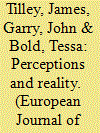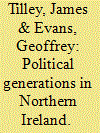|
|
|
Sort Order |
|
|
|
Items / Page
|
|
|
|
|
|
|
| Srl | Item |
| 1 |
ID:
120136


|
|
|
|
|
| Publication |
2013.
|
| Summary/Abstract |
Recent literature has shown that the long established link between economic performance and electoral outcomes is conditioned by a country's institutions and government, what is often termed 'clarity of responsibility'. In this article two distinct dimensions of the clarity of the political context are identified: institutional and government clarity. The first captures the formal dispersion of government power, both horizontally and vertically. The second captures the cohesion of the incumbent government. Analysing survey data from 27 European countries, it is shown that voters' ability to hold governments to account, for both the economy and management of public services, is primarily influenced by the extent to which there is an identifiable and cohesive incumbent, whereas formal institutional rules have no direct impact on performance voting.
|
|
|
|
|
|
|
|
|
|
|
|
|
|
|
|
| 2 |
ID:
156796


|
|
|
|
|
| Summary/Abstract |
The first thing to do is, of course, thank the four authors for all of their thoughts on the New Politics of Class (from now on NPC). In this response, we want to both address some of the issues that they raise, but also reflect a little on our findings and conclusion in the light of the 2017 general election. Before doing either of these, it is perhaps worth setting out the main argument of the book, which focuses on three main claims about British politics since 1945. First, ideological divisions among people due to occupational class and education have been fairly constant over the last seventy years. Second, parties have changed, and this change was a one-off shock to the system in the 1990s with the emergence of New Labour. And third, this combination of voter continuity and party change resulted in a large decline in class voting for the main parties in the 1990s and a delayed, but equally large, increase in class non-voting in the 2000s.
|
|
|
|
|
|
|
|
|
|
|
|
|
|
|
|
| 3 |
ID:
083266


|
|
|
|
|
| Publication |
2008.
|
| Summary/Abstract |
Abstract. One of the most influential explanations of voting behaviour is based on economic factors: when the economy is doing well, voters reward the incumbent government and when the economy is doing badly, voters punish the incumbent. This reward-punishment model is thought to be particularly appropriate at second order contests such as European Parliament elections. Yet operationalising this economic voting model using citizens' perceptions of economic performance may suffer from endogeneity problems if citizens' perceptions are in fact a function of their party preferences rather than being a cause of their party preferences. Thus, this article models a 'strict' version of economic voting in which they purge citizens' economic perceptions of partisan effects and only use as a predictor of voting that portion of citizens' economic perceptions that is caused by the real world economy. Using data on voting at the 2004 European Parliament elections for 23 European Union electorates, the article finds some, but limited, evidence for economic voting that is dependent on both voter sophistication and clarity of responsibility for the economy within any country. First, only politically sophisticated voters' subjective economic assessments are in fact grounded in economic reality. Second, the portion of subjective economic assessments that is a function of the real world economy is a significant predictor of voting only in single party government contexts where there can be a clear attribution of responsibility. For coalition government contexts, the article finds essentially no impact of the real economy via economic perceptions on vote choice, at least at European Parliament elections.
|
|
|
|
|
|
|
|
|
|
|
|
|
|
|
|
| 4 |
ID:
105704


|
|
|
|
|
| Publication |
2011.
|
| Summary/Abstract |
Since the late 1980s, Northern Ireland has seen a radical electoral shift away from the historically dominant parties in the Catholic and Protestant blocs - the Social Democratic and Labour Party (SDLP) and Ulster Unionist Party (UUP), respectively - towards the traditionally more 'extreme' parties - Sinn Fein and the Democratic Unionist Party (DUP). This change in aggregate support has been accompanied by increasing differences between generations as older cohorts of UUP and SDLP supporters have been replaced by newer cohorts of DUP and Sinn Fein partisans. This is not a result of increased polarisation in values and attitudes (whether overtly political or simply communal intolerance) among younger cohorts who are, if anything, slightly more moderate than their forbears. Rather, this results from the changing political context in which new generations have been socialised - in particular the expanded choice sets facing voters as they have reached voting age. This in turn has positive implications for the consolidation of devolved democratic governance.
|
|
|
|
|
|
|
|
|
|
|
|
|
|
|
|
|
|
|
|
|